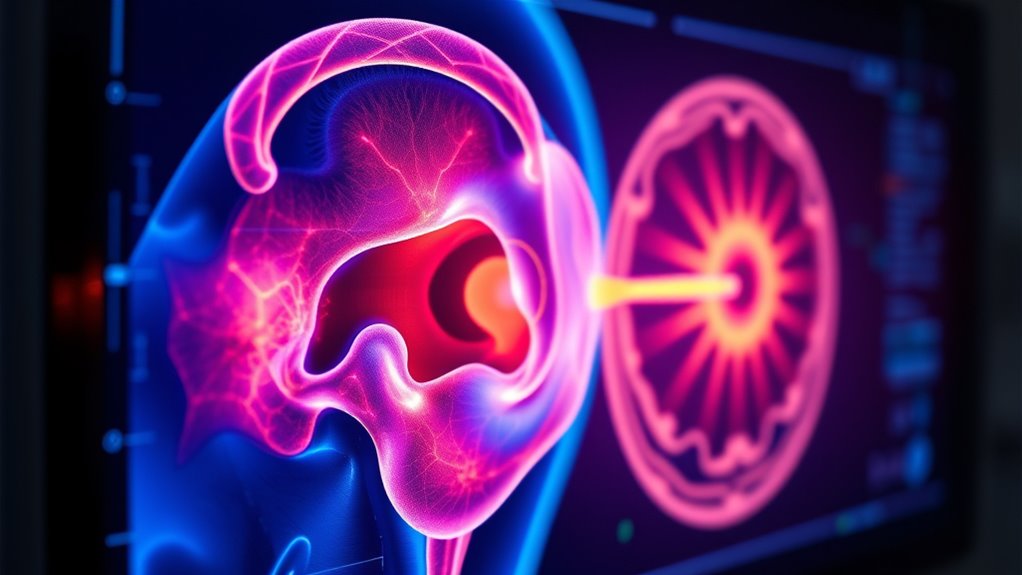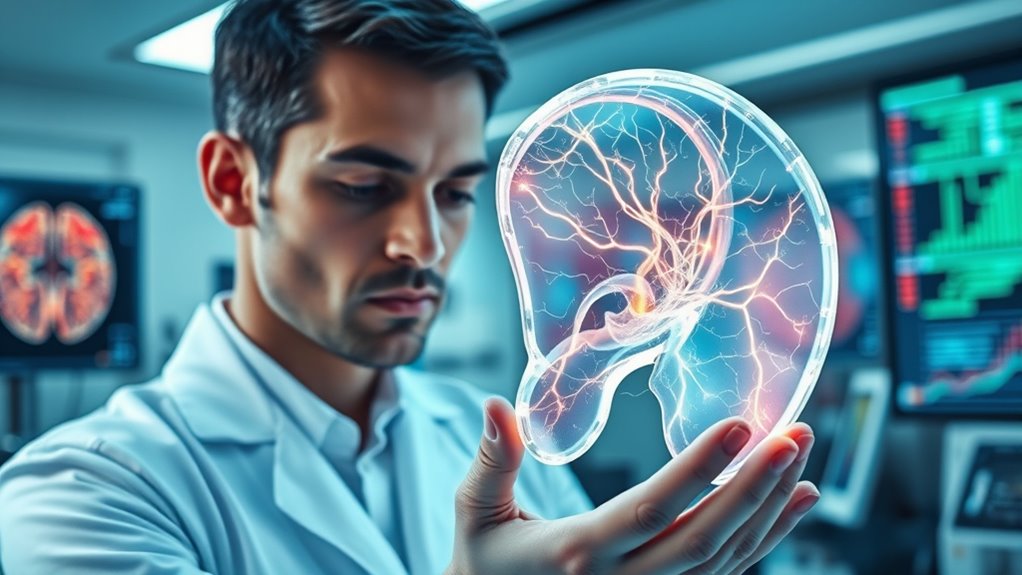AI models now detect early-stage cancer with over 90% accuracy, helping you catch disease at its earliest and most treatable moments. They analyze large amounts of medical data like scans, slides, and genetic info, supporting healthcare providers with precise and earlier diagnoses. This advancement improves survival chances and treatment outcomes. To understand how these models work, how they guarantee fairness, and what ethical considerations come into play, keep exploring further details.
Key Takeaways
- AI models analyze medical imaging and genetic data to detect early-stage cancer with over 90% accuracy.
- Early detection by AI supports timely intervention, improving patient outcomes.
- AI-driven diagnosis enhances sensitivity beyond human limitations, identifying subtle cancer signs.
- Rigorous validation and oversight ensure AI recommendations are fair, transparent, and ethically deployed.
- AI acts as a supportive tool for healthcare providers, maintaining clinical accountability and patient trust.

Advancements in artificial intelligence are transforming cancer detection, allowing for diagnosis at the earliest possible stages. When an AI model can identify cancer with over 90% accuracy, it opens new possibilities for saving lives and improving treatment outcomes. However, integrating such technology into healthcare also raises important considerations around medical ethics and data privacy. You need to understand how these factors influence the deployment and acceptance of AI-based diagnostics.
AI-driven cancer detection offers early diagnosis with high accuracy but requires careful attention to ethics and data privacy.
As you explore this innovative approach, you’ll find that AI models analyze vast amounts of medical data—such as imaging scans, histopathology slides, and genetic information—to detect subtle signs of early-stage cancer. This capability enables healthcare providers to intervene sooner, increasing the chances of successful treatment. But with this increased reliance on data comes a responsibility to uphold medical ethics. Guaranteeing that the AI’s recommendations are transparent, fair, and free from biases is essential. You should be aware that if the AI is trained on non-representative datasets, it might perform poorly for certain populations, potentially delaying diagnoses or causing misdiagnoses. Ethical deployment demands rigorous validation, continuous oversight, and adherence to clinical standards to uphold patient safety and trust.
Furthermore, you should consider the broader implications of using AI for cancer diagnosis. While the technology offers remarkable accuracy, it also raises questions about accountability. If an AI system misses an early warning sign or produces a false positive, who is responsible? Guaranteeing clear lines of responsibility and establishing protocols for human oversight are essential. You’ll also want to stay informed about ongoing debates surrounding AI in medicine, including the importance of maintaining the physician-patient relationship and ensuring that AI remains a tool to support, not replace, clinical judgment. Additionally, understanding machine learning and how models are trained on data can help you better evaluate their reliability and limitations.
Frequently Asked Questions
How Does the AI Model Compare to Expert Radiologists?
You’ll find that the AI model enhances diagnostic accuracy by working alongside radiologist collaboration. It detects cancer in its earliest stages with over 90% accuracy, often outperforming individual radiologists. However, it’s not meant to replace experts but to support them, helping you make more precise diagnoses. By combining AI’s speed and consistency with radiologists’ clinical judgment, you get a powerful approach to early cancer detection.
Can This AI Detect All Types of Cancer?
Think of this AI like a skilled detective, but even the sharpest detective has limits. It excels at early detection of certain cancers, like ear tumors, with over 90% accuracy, yet it can’t spot all types due to model limitations. While it’s a powerful tool, you should remember it’s not a one-size-fits-all solution. For exhaustive cancer detection, combining AI insights with expert care remains essential.
What Are the Costs Associated With Implementing This AI?
The costs of implementing this AI include a thorough cost analysis and addressing implementation challenges like integrating with existing systems and training staff. You should expect expenses for hardware, software, ongoing maintenance, and staff education. While initial investment might be high, the improved early detection could save money long-term. Carefully evaluate these factors to guarantee smooth integration and maximize the AI’s benefits in your healthcare setting.
How Is Patient Data Privacy Maintained?
You guarantee patient data privacy by using data encryption, which protects sensitive information during storage and transmission. Additionally, you follow strict privacy compliance standards, such as HIPAA or GDPR, to meet legal requirements and safeguard patient rights. Regular audits and secure access controls further prevent unauthorized use, keeping patient data private while allowing the AI system to function effectively and accurately.
When Will This Technology Be Available Clinically?
It’s exciting that this technology may be available clinically within the next few years. Coincidences happen often in medical advancements—like how a breakthrough in AI coincided with new regulatory standards. Typically, it takes about 2-3 years for clinical trial timelines and regulatory approval processes to be completed. So, you might see this AI tool in your doctor’s office around 2026 or 2027, depending on how smoothly it advances through testing.
Conclusion
You can confidently capitalize on this cutting-edge cancer-capturing technology, as AI’s astonishing accuracy allows you to detect disease early and easily. With its remarkable reliability, you’ll realize rapid results and relentless reassurance. Embrace this exciting evolution in medical excellence, empowering you to prevent potential problems proactively. By trusting this transformative tool, you’re taking a bold step toward better health, brighter futures, and a barrier-breaking breakthrough in battling cancer before it begins.










